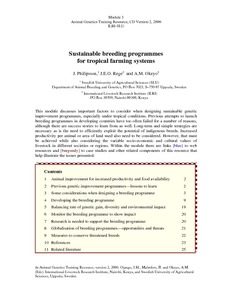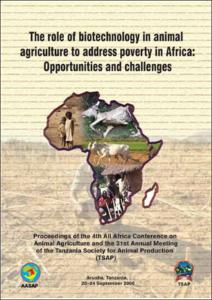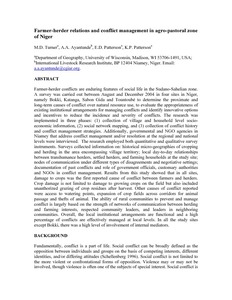The potential benefits and challenges of agricultural animal biotechnology to pastoralists
The livelihoods of pastoralists revolve around their indigenous livestock. Combining high
production with disease resistance using genetic engineering is a biotechnological intervention
hailed by some as a promising avenue to mitigate food insecurity and poverty. Considerable
human and financial resources have already been devoted to exploring this option. However, the
challenges are enormous. It is unlikely that such livestock would survive in the harsh ecosystems
The role of biotechnology in animal agriculture to address poverty in Africa: opportunities and challenges
‘Our land they took’: San land rights under threat in Namibia
A study of the San, the poorest and most marginalised minority group in Namibia, with little access to existing political and economic institutions. They have been dispossessed of most of their ancestral lands and on lands they still occupy there are major issues of resource overuse, degradation, illegal grazing, unclear legal status and ongoing threats of dispossession. Looks at threats to San lands in 4 distinct parts of the country and the legal issues raised by those threats.
Baseline 2004: Changing the way we manage water for food, livelihoods, health and the environment
There are many options for enhancing food production from fish in managed aquatic systems.The most appropriate technology, however, will vary from place to place, and the conditions under which one technology is prefered over another are still not well defined.
Sustainable management of marginal drylands. Proceedings: Fourth Project Workshop Islamabad Pakistan 27-31 January 2006
The conference reviewed the current state-of-knowledge of dryland ecosystems; it identified important knowledge gaps for defining future paths of research into drylands; and it commemorated fifty years of dryland research in the UN system in the context of the International Year of Deserts and Desertification. The conference - in a cross-cutting manner - also addressed issues related to research and science needed for dryland conservation, policy options for sustainable dryland development, and necessary interventions and
Access to water, pastoral resource management and pastoralists’ livelihoods
This paper represents part of an area of work which analyses the linkages between rights to land and water. An initial scoping paper explored the interface between land and water rights (LSP Working Paper 10: Hodgson, S. (2004). “Land and water – the rights interface”). It is complemented by two regional analyses: this Working Paper and LSP Working Paper 25: IIED. (2006). “Land and water rights in the Sahel: Tenure challenges of improving access to water for agriculture”.
Farmer-herder relations and conflict management in agro-pastoral zone of Niger
Farmer-herder conflicts are enduring features of social life in the Sudano-Sahelian zone.
A survey was carried out between August and December 2004 in four sites in Niger,
namely Bokki, Katanga, Sabon Gida and Tountoubé to determine the proximate and
long-term causes of conflict over natural resource use, to evaluate the appropriateness of
existing institutional arrangements for managing conflicts and identify innovative options
and incentives to reduce the incidence and severity of conflicts. The research was
ICARDA Annual Report 2005
The year 2005 was an important milestone in the efforts of ICARDA and its partners in meeting the global challenges of agriculture in dry areas through the application of science. In an assessment of all 15 CGIAR Centers (based on science quality and relevance, impacts, partnerships, and financial and institutional health), conducted by the CGIAR in collaboration with the Science Council and the World Bank, ICARDA was rated outstanding" - one of only two centers to receive this rating.
Better land access for the rural poor. Lessons from experience and challenges ahead
Main chapters cover access to land and poverty reduction, land redistribution, and securing land rights. The last includes the role of land markets, women’s land rights, securing local resource rights in foreign investment projects, protecting the rights of indigenous peoples and pastoralists, conflicts.
Plan d’action national pour l’environnement,
L’objectif du Plan d’action national pour l’environnement est de promouvoir une gestion globale et rationnelle de l'environnement en vue d'améliorer le cadre et les conditions de vie des populations dans la perspective d'un développement durable.









